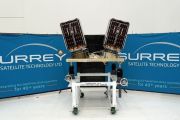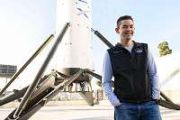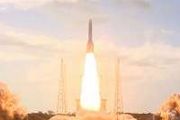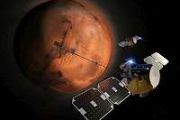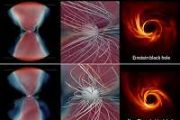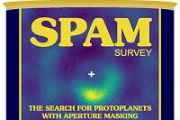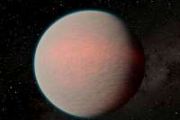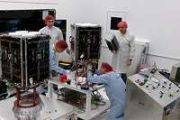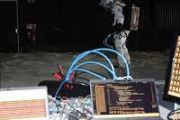
Copernical Team
Test conducted to verify spacecraft technology, FM says
 The Chinese space test that drew great attention was made to verify reusable spacecraft technologies, not to test a nuclear-capable hypersonic missile, as some foreign media claimed, the Foreign Ministry said on Monday.
Responding to questions about the test, ministry spokesman Zhao Lijian said at a daily briefing at the ministry in Beijing that he was told it was a regular test flight by
The Chinese space test that drew great attention was made to verify reusable spacecraft technologies, not to test a nuclear-capable hypersonic missile, as some foreign media claimed, the Foreign Ministry said on Monday.
Responding to questions about the test, ministry spokesman Zhao Lijian said at a daily briefing at the ministry in Beijing that he was told it was a regular test flight by China's longest-yet crewed space mission impressive, expert says
 China's Shenzhou XIII crewed spaceship successfully docked with the port of the space station core module Tianhe on Saturday, a move overseas experts have called another "key step" forward in China's space exploration.
Three Chinese astronauts aboard the Shenzhou XIII will stay in orbit for six months, making China's longest yet crewed mission for space station construction.
Denis Si
China's Shenzhou XIII crewed spaceship successfully docked with the port of the space station core module Tianhe on Saturday, a move overseas experts have called another "key step" forward in China's space exploration.
Three Chinese astronauts aboard the Shenzhou XIII will stay in orbit for six months, making China's longest yet crewed mission for space station construction.
Denis Si Over half OneWeb constellation now deployed
 Arianespace has successfully performed Soyuz Flight ST36. This latest launch for OneWeb's placed 36 more satellites into orbit. ST36 represents an important step in OneWeb and Arianespace's partnership: the operator now has more than half, 358 satellites, of its constellation on orbit.
Performed on Thursday, October 14 at precisely 6:40 pm. local time at Russia's Vostochny Cosmodrome (9:40
Arianespace has successfully performed Soyuz Flight ST36. This latest launch for OneWeb's placed 36 more satellites into orbit. ST36 represents an important step in OneWeb and Arianespace's partnership: the operator now has more than half, 358 satellites, of its constellation on orbit.
Performed on Thursday, October 14 at precisely 6:40 pm. local time at Russia's Vostochny Cosmodrome (9:40 China describes hypersonic test as a space vehicle trial
 The Financial Times earlier reported that the test of the alleged hypersonic glider vehicle by China this summer "caught the US government by surprise" as it purportedly demonstrated the great progress achieved by Beijing in this area.
China did not carry out a test of hypersonic weapons, but instead carried out a trial of a spacecraft, Chinese Foreign Ministry spokesman Zhao Lijian has st
The Financial Times earlier reported that the test of the alleged hypersonic glider vehicle by China this summer "caught the US government by surprise" as it purportedly demonstrated the great progress achieved by Beijing in this area.
China did not carry out a test of hypersonic weapons, but instead carried out a trial of a spacecraft, Chinese Foreign Ministry spokesman Zhao Lijian has st To watch a comet form, a spacecraft could tag along for a journey toward the sun
 Deep in the solar system, between Jupiter and Neptune, lurk thousands of small chunks of ice and rock. Occasionally, one of them will bump into Jupiter's orbit, get caught and flung into the inner solar system-towards the sun, and us.
This is thought to be the source of many of the comets that eventually pass Earth. A new study lays out the dynamics of this little-understood system. Among
Deep in the solar system, between Jupiter and Neptune, lurk thousands of small chunks of ice and rock. Occasionally, one of them will bump into Jupiter's orbit, get caught and flung into the inner solar system-towards the sun, and us.
This is thought to be the source of many of the comets that eventually pass Earth. A new study lays out the dynamics of this little-understood system. Among The October Council edition of ESA Impact is online

ESA Impact October Council edition
Great images and videos of climate change on view, BepiColombo flies by Mercury, Cheops gets a surprise, and more
Titan's river maps may advise Dragonfly's sedimental journey

With future space exploration in mind, a Cornell-led team of astronomers has published the final maps of Titan's liquid methane rivers and tributaries—as seen by NASA's late Cassini mission—so that may help provide context for Dragonfly's upcoming 2030s expedition.
The fluvial maps and details of their accuracy were published in the Planetary Science Journal. In addition to the maps, the work examined what could be learned by analyzing Earth's rivers by using degraded radar data—similar to what Cassini saw.
Like water on Earth, liquid methane and ethane fill Titan's lakes, rivers and streams. But understanding those channels—including their twists and branch-like turns—is key to knowing how that moon's sediment transport system works and the underlying geology.
"The channel systems are the heart of Titan's sediment transport pathways," said Alex Hayes, associate professor of astronomy in the College of Arts and Sciences.
NASA Selects Gamma-ray Telescope to Chart Milky Way Evolution
 NASA has selected a new space telescope proposal that will study the recent history of star birth, star death, and the formation chemical elements in the Milky Way.
NASA has selected a new space telescope proposal that will study the recent history of star birth, star death, and the formation chemical elements in the Milky Way. A spacecraft could use gravity to prevent a dangerous asteroid impact
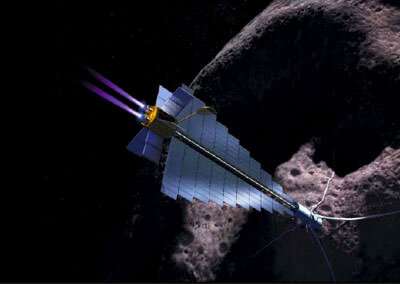
The idea of avoiding asteroid impacts has featured prominently in the public's mind for decades—especially since the release of movies such as Deep Impact and Armageddon. But is using a nuclear explosion the best way to deal with potentially hazardous space rocks? Decidedly not. If given enough time, there is a much more effective (and safer) way to deal with any object on a collision course with Earth—a gravity tractor. Now, Dr. Yohannes Ketema from the University of Minnesota has developed a flight pattern that makes this simplest of all asteroid defense mechanisms that much more effective.
Gravity tractors have been around for a while. They use the gravity of an artificial body to pull an object toward it and slightly change its trajectory. Over long periods, this would pull the hazardous object out of the current trajectory into a safer one. It also has the advantage of not requiring any direct impact or explosion on the surface of the asteroid itself.
Death in space: Here's what would happen to our bodies

As space travel for recreational purposes is becoming a very real possibility, there could come a time when we are traveling to other planets for holidays, or perhaps even to live. Commercial space company Blue Origin has already started sending paying customers on sub-orbital flights. And Elon Musk hopes to start a base on Mars with his firm SpaceX.
This means we need to start thinking about what it will be like to live in space—but also what will happen if someone dies there.
After death here on Earth, the human body progresses through a number of stages of decomposition. These were described as early as 1247 in Song Ci's The Washing Away of Wrongs, essentially the first forensic science handbook.
First the blood stops flowing and begins to pool as a result of gravity, a process known as livor mortis. Then the body cools to algor mortis, and the muscles stiffen due to uncontrolled build-up of calcium in the muscle fibers. This is the state of rigor mortis.


